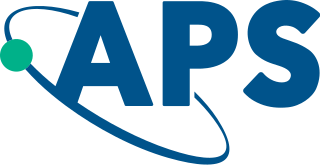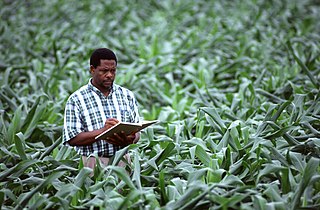Related Research Articles
The Association for Computing Machinery (ACM) is a US-based international learned society for computing. It was founded in 1947 and is the world's largest scientific and educational computing society. The ACM is a non-profit professional membership group, claiming nearly 110,000 student and professional members as of 2022. Its headquarters are in New York City.
Professional certification, trade certification, or professional designation, often called simply certification or qualification, is a designation earned by a person to assure qualification to perform a job or task. Not all certifications that use post-nominal letters are an acknowledgement of educational achievement, or an agency appointed to safeguard the public interest.

The American Physical Society (APS) is a not-for-profit membership organization of professionals in physics and related disciplines, comprising nearly fifty divisions, sections, and other units. Its mission is the advancement and diffusion of knowledge of physics. The society publishes more than a dozen scientific journals, including the prestigious Physical Review and Physical Review Letters, and organizes more than twenty science meetings each year. APS is a member society of the American Institute of Physics. Since January 2021 the organization has been led by chief executive officer Jonathan Bagger.

The American Association for the Advancement of Science (AAAS) is an American international non-profit organization with the stated goals of promoting cooperation among scientists, defending scientific freedom, encouraging scientific responsibility, and supporting scientific education and science outreach for the betterment of all humanity. AAAS was the first permanent organization to promote science and engineering nationally and to represent the interests of American researchers from across all scientific fields. It is the world's largest general scientific society, with over 120,000 members, and is the publisher of the well-known scientific journal Science.
The American Statistical Association (ASA) is the main professional organization for statisticians and related professionals in the United States. It was founded in Boston, Massachusetts on November 27, 1839, and is the second oldest continuously operating professional society in the US. The ASA services statisticians, quantitative scientists, and users of statistics across many academic areas and applications. The association publishes a variety of journals and sponsors several international conferences every year.

The American Chemical Society (ACS) is a scientific society based in the United States that supports scientific inquiry in the field of chemistry. Founded in 1876 at New York University, the ACS currently has more than 155,000 members at all degree levels and in all fields of chemistry, chemical engineering, and related fields. It is one of the world's largest scientific societies by membership. The ACS is a 501(c)(3) non-profit organization and holds a congressional charter under Title 36 of the United States Code. Its headquarters are located in Washington, D.C., and it has a large concentration of staff in Columbus, Ohio.

The American Society for Microbiology (ASM), originally the Society of American Bacteriologists, is a professional organization for scientists who study viruses, bacteria, fungi, algae, and protozoa as well as other aspects of microbiology. It was founded in 1899. The Society publishes a variety of scientific journals, textbooks, and other educational materials related to microbiology and infectious diseases. ASM organizes annual meetings, as well as workshops and professional development opportunities for its members.

The American Meteorological Society (AMS) is the premier scientific and professional organization in the United States promoting and disseminating information about the atmospheric, oceanic, and hydrologic sciences. Its mission is to advance the atmospheric and related sciences, technologies, applications, and services for the benefit of society.

The Acoustical Society of America (ASA) is an international scientific society founded in 1929 dedicated to generating, disseminating and promoting the knowledge of acoustics and its practical applications. The Society is primarily a voluntary organization of about 7500 members and attracts the interest, commitment, and service of many professionals.
Society for Industrial and Applied Mathematics (SIAM) is a professional society dedicated to applied mathematics, computational science, and data science through research, publications, and community. SIAM is the world's largest scientific society devoted to applied mathematics, and roughly two-thirds of its membership resides within the United States. Founded in 1951, the organization began holding annual national meetings in 1954, and now hosts conferences, publishes books and scholarly journals, and engages in advocacy in issues of interest to its membership. Members include engineers, scientists, and mathematicians, both those employed in academia and those working in industry. The society supports educational institutions promoting applied mathematics.

Animal science is described as "studying the biology of animals that are under the control of humankind". It can also be described as the production and management of farm animals. Historically, the degree was called animal husbandry and the animals studied were livestock species, like cattle, sheep, pigs, poultry, and horses. Today, courses available look at a broader area, including companion animals, like dogs and cats, and many exotic species. Degrees in Animal Science are offered at a number of colleges and universities. Animal science degrees are often offered at land-grant universities, which will often have on-campus farms to give students hands-on experience with livestock animals.
The American Medical Writers Association (AMWA) is a professional association for medical communicators, with more than 4,000 members in the United States, Canada, and 30 other countries. AMWA is governed by a board of directors composed of the elected officers, 6–8 at-large directors, and the chapter advisory council chair. AMWA has regional chapters and provides local networking opportunities throughout the United States and Canada. The association was founded in 1940 by physicians interested in improving the quality of medical writing and editing. The current president is Gail Flores, PhD.

The Soil Science Society of America (SSSA), is the largest soil-specific society in the United States. It was formed in 1936 from the merger of the Soils Section of the American Society of Agronomy and the American Soil Survey Association. The Soils Section of ASA became the official Americas section of the International Union of Soil Sciences in 1934, a notable role which SSSA continues to fulfill.

An agriculturist, agriculturalist, agrologist, or agronomist, is a professional in the science, practice, and management of agriculture and agribusiness. It is a regulated profession in Canada, India, the Philippines, the United States, and the European Union. Other names used to designate the profession include agricultural scientist, agricultural manager, agricultural planner, agriculture researcher, or agriculture policy maker.

The Society for Conservation Biology (SCB) is an 501(c)(3) non-profit international professional organization that is dedicated to conserving biodiversity. There are over 4,000 members worldwide, including students and those in related non-academic sectors.There are 35 chapters throughout the world.
Strategic and Competitive Intelligence Professionals (SCIP), formerly the Society of Competitive Intelligence Professionals, is a global non-profit best practice sharing community for experts from industry, academia, government, and non-profits in Strategic Intelligence: competitive intelligence, market intelligence, market research, strategic analysis, business intelligence, and strategy. SCIP is one of the only global membership organizations in the field of competitive intelligence (CI) and business strategy and organizes an annual international meeting and exposition. The last (2019) annual meeting was held in Orlando, Florida, US, and the 2020 Conference will be held May 11-13, 2020 outside Chicago, Illinois. It is called SCIP IntelliCon 2020.
The Association for Talent Development (ATD), formerly American Society for Training & Development (ASTD), is a non-profit association serving those who develop talent in the workplace.
The purpose of the International Commission for Acoustics (ICA) is to promote international development and collaboration in all fields of acoustics including research, development, education, and standardisation.
The Computing Technology Industry Association, more commonly known as CompTIA, is an American non-profit trade association that issues professional certifications for the information technology (IT) industry. It is considered one of the IT industry's top trade associations.
The Department of Public Policy, formerly School of Public Policy (SPP) at Central European University (CEU) is an English-language graduate institution with campuses in Budapest and Vienna. CEU was founded by philanthropist George Soros.
References
- 1 2 3 4 About ARPAS/What is ARPAS( http://www.arpas.org/ ) Accessed December 14, 2021
- ↑ Kramer, M.H., Animal Careers. (http://animalcareers.about.com/od/Careers/a/Animal-Scientist.htm Archived 2013-10-12 at the Wayback Machine ) Accessed January 15, 2014
- 1 2 3 4 5 History of ARPAS/ARPAS History - PDF (http://www.arpas.org/ ) Accessed December 14, 2021
- 1 2 3 4 History of ARPAS/ARPAS History – Power Point (http://www.arpas.org) Accessed December 14, 2021
- 1 2 3 ARPAS Chapters (http://www.arpas.org/) Accessed January 15, 2014
- ↑ NRCS TSP Program (http://www.arpas.org/) Accessed January 15, 2014
- 1 2 Certification/Requirements (http://www.arpas.org/) Accessed January 15, 2014
- ↑ Certification/Board (http://www.arpas.org/) Accessed January 15, 2014) Accessed January 15, 2014
- ↑ Membership Services/Approved Meetings ( http://www.arpas.org/) Accessed January 15, 2014
- ↑ Publications/Newsletter ( http://www.arpas.org/) Accessed December 14, 2021
- ↑ ARPAS Officers and Board/Handbook, Bylaws and Constitution/ARPAS By-Laws (PDF) Article XIV Chapters, Section 4 ( http://www.arpas.org/) Accessed December 14, 2021